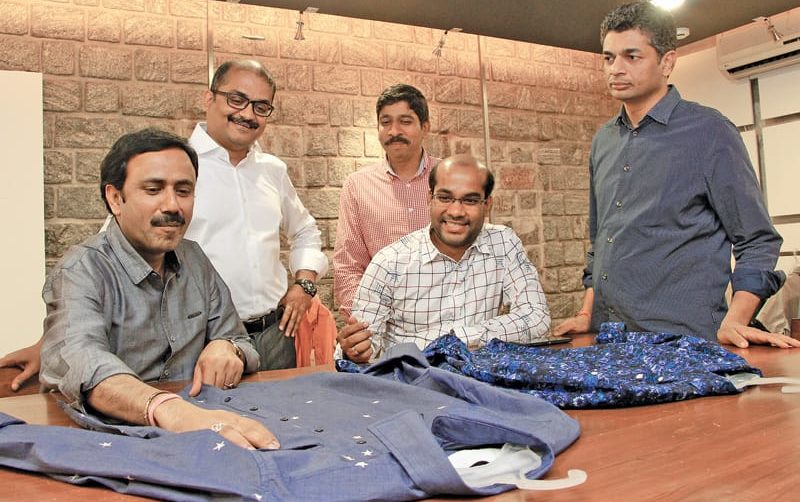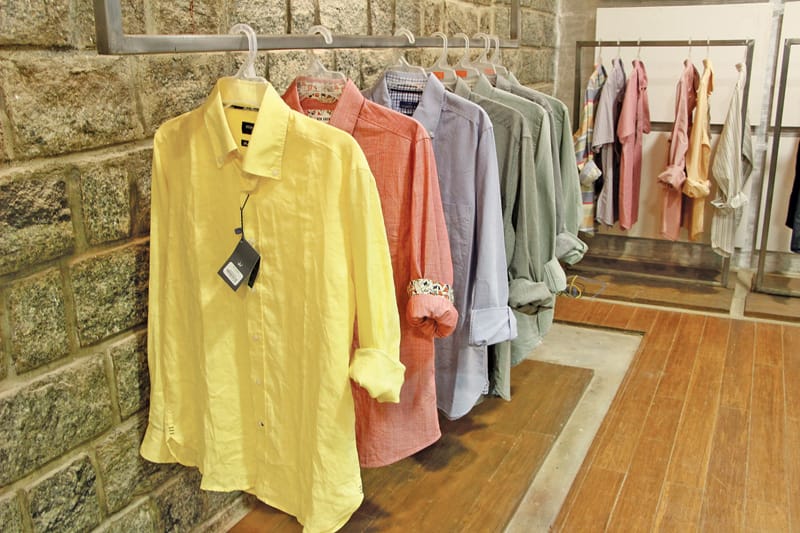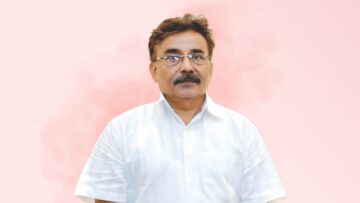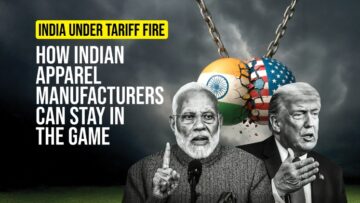
The Indian garment manufacturing industry has never been a hot bed for investment by foreign enterprises and there are very few success stories to emulate. Yet, Aquarelle the casual shirts division of the Mauritius-based CIEL Textile Group (Apparel Division) which has 20 factories located in four countries – Mauritius, Madagascar, India and Bangladesh, is a growing company which is proud to be Indian by team but international in its functioning. The Team of Apparel Online visited their factory on the outskirts of Bangalore and was impressed with the professionalism that they observed. In conversation with the top management of Nagesh Badida, Executive Director and Parameswar Chopparapu, Global Manufacturing Director, Aquarelle Group, the strategy behind the success is decoded…
Choosing India over China…
The team at Aquarelle stresses that they have seized to consider themselves as a ‘foreign’ company as an Indian team handles the operations on a day-to-day basis, but feels international because of their existence in different countries. “I feel like a foreign company because of our management philosophy and principles which are common to all our factories in every country,” says Nagesh. India was zeroed in as a better option than China after much deliberations. The top management felt that China was already a big manufacturing base with many state-of-the art companies, so there was no sense competing for orders in China against the Chinese, the choice of the country had to be where opportunities in garmenting still existed.
The next best bet was India for many reasons, including the fact that the company already had a tie-up with an Indian company Essar Textiles (now known as Consolidated Fabrics Ltd. (CFL) which owed 25% of shares in Woven Fabrics in Mauritius and there were some Indians, including Nagesh, already working for the company in Mauritius. Further, Mauritius is pretty similar to India culturally, with 70% of the population originating from India. Since Bangalore already had a culture for manufacturing of men’s wear and the labour is very well tuned to men’s shirts, it was the first preference for setting up a casual shirts factory.
No doubt, purchasing land and building a factory by foreign companies is a big hassle with many procedural hurdles, with the Government thrust at that point of time being more on big-ticket industries. “We were lucky to find a built-up property with all infrastructures in place near the city otherwise we would have faced the usual issues related to Government policies and it would have been difficult to get the factory up and running so fast,” reasons Nagesh.
People are the biggest challenge…
Yet, these positive points in no way negated the challenges that international companies face when setting up business in India. The biggest being the handling of labour, which according to most is not as disciplined as in other countries including China. “You can have good or bad people, but more important is how you structure the training process and how you carry those people around,” argues Parameswar. Nagesh adds that their Chairman strongly believes that a company grows not from its infrastructure and machines, but by its people. This is a philosophy that has no compromise. “We treat our workers well and not like garment making machines; we educate them as to what is our concept, what is the culture and what we expect from them, and for that we have some 10-15 days of training sessions that focuses on the do’s and don’ts in the Aquarelle Group and how we recognize their hard work and pay them back in terms of incentives,” shares Nagesh.
The HR team at Aquarelle is very strong; their job is to communicate and create linkages and update workers constantly on what is happening in the company… That’s an ongoing process. “Since we are a global company, most of our processes are standardised and structured, and followed in all four countries, yet culturally there are differences with every country having its nuances, so we have to look at how to manage them individually and that is something that is left to us. In terms of today, if you look at our products, be it our services or deliverables, they are more or less consistent. If you look at our working you would hardly find any deviation in the process from country to country,” avers Nagesh. So the formulae is simple – Local nuances will always remain, and so will the importance of local expertise to hold and manage the factories and the people. But at the end of the day, the same road map will be carried forward. To build local talents and deal with the people, the formula may be international but thinking will be local.
Standardisation of processes…
On the other hand, there are a lot of things – cutting, sewing, finishing; and general operations or hard core manufacturing which is similar everywhere. So for every single product the clarity of operations is very clear. “We have a unique GSP (Global Standardisation Processes) which we are driving in for the last 3 years. We have a team working on the system to make all factories uniform. So what runs here for casual shirts runs the same in the other two factories in the other countries. The product nuances according to the customer is handled and managed by the local people… Like you talk about a certain sewing automation process, which happens as long as it makes cost sense in the country,” says Parameswar.
Marketing Aquarelle, not a country…
When the marketing team meets the customers they don’t talk on Indian, Madagascar or Mauritius lines, they introduce Aquarelle as a global company that can produce the same product from any country be it in Madagascar or Mauritius or India and GSP ensures that no matter where it is produced the goods remains standardised.
I nterestingly there are some areas of blurring in this very straight jacket approach, mostly in terms of pricing. “If the shirts are 100 per cent cotton then they are produced in the same price bracket at all the three manufacturing destinations, but if something is made on regional basis then the prices vary. For example, if denim or any hand-working job is required and if it turns out be a common product in 100 per cent cotton then we give the customers the liberty to pick their preference locations from where they want pick the products. If it is India you get India prices,” explains Nagesh.
nterestingly there are some areas of blurring in this very straight jacket approach, mostly in terms of pricing. “If the shirts are 100 per cent cotton then they are produced in the same price bracket at all the three manufacturing destinations, but if something is made on regional basis then the prices vary. For example, if denim or any hand-working job is required and if it turns out be a common product in 100 per cent cotton then we give the customers the liberty to pick their preference locations from where they want pick the products. If it is India you get India prices,” explains Nagesh.
Having operations in many countries has its advantages, which the buyers also recognize. “Mauritius is duty-free to the US and I will not even try to compete with Mauritius in this market. Our flagship customer, J Crew predominantly have their business done in Mauritius, even then they know we are in India too and India is restively cheaper, but after the duty-free advantage we lose out hands down, so there is no competition. Again for production in Madagascar, though again it is more expensive than India the proximity advantage it enjoys attracts buyers looking for quick turnarounds,” avers Parameswar.
Motivating the local management…
So what keeps the Indian team motivated to show growth, when India is thriving on private business. “The biggest difference that I see from an Indian company is the entrepreneurship concept which these guys put in. We have corporate culture and we are all salary-based, but there is a balanced approach so that one should feel that he is working in his own company, as they give a lot of freedom; they recruit top guys and make them responsible for A to Z of the company. Second thing is the entrepreneurial way of working. Even if I am spending one rupee, I would think twice and think what the better way is,” shares Nagesh.
The level of performance is aided by the group philosophy where a certain percentage share of profit, as rider on sales per business unit is distributed. “So we access that part of the profitability and multiply it my ‘X’ numbers, which is given to the top people and the other people who have really worked hard so I can say that this is really motivating for me,” shares Nagesh. He goes on to elaborate, “Let’s say the business turnover of my operations is ‘X’ number of dollar millions, then they get a certain percentage of that straight away. In our case we devise a certain percentage of shares for the staff and others. Our whole concept of business is based on transparency and performance.”






